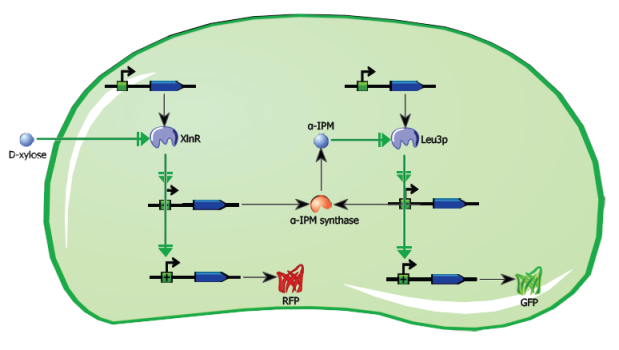Team:Wageningen UR/Project/CompleteProject2Description
From 2011.igem.org
(→Fungal Track 'n Trace) |
(→Fungal Track 'n Trace) |
||
| Line 28: | Line 28: | ||
{{:Team:Wageningen_UR/Templates/Style | text= __NOTOC__ | {{:Team:Wageningen_UR/Templates/Style | text= __NOTOC__ | ||
| + | === Complete Project Description === | ||
| - | + | =====1. Introduction===== | |
| - | ==== | + | |
| - | + | ||
| - | + | ||
The aim of this project is to design and implement a sustained, self-propagating intercellular signalling system in the hyphal fungus ''Aspergillus nidulans''. After initial induction, a genetic feed-forward loop will activate, resulting in the production of a signalling molecule. This molecule will diffuse through the septum into neighbouring cells, where it will enter the nuclei, and activate a transcription factor. This transcription factor will in turn activate the feed-forward loop, increasing the production of the signalling molecule and thereby allowing the signal to propagate throughout the hyphal network. This process will be visualized using fluorescent reporter proteins. | The aim of this project is to design and implement a sustained, self-propagating intercellular signalling system in the hyphal fungus ''Aspergillus nidulans''. After initial induction, a genetic feed-forward loop will activate, resulting in the production of a signalling molecule. This molecule will diffuse through the septum into neighbouring cells, where it will enter the nuclei, and activate a transcription factor. This transcription factor will in turn activate the feed-forward loop, increasing the production of the signalling molecule and thereby allowing the signal to propagate throughout the hyphal network. This process will be visualized using fluorescent reporter proteins. | ||
| - | ==== Mechanism ==== | + | =====2. Mechanism ===== |
The initial activation of the circuit will be done by application of D-xylose to part of a hypha. D-xylose will enter the nucleus and bind to a transcription factor regulating the expression of red fluorescent protein and alpha-isopropylmalate-synthase via the XlnA:goxC promoter sequence. Thus the activation of this promoter region will cause RFP to be produced, as well as alpha-IPM-synthase, which will in turn synthesize alpha-IPM. Alpha-IPM will then diffuse through the septa and into the nuclei of neighbouring cells, where it will bind to the heterologous transcription factor Leu3p and activate the alpha-IPM feed-forward loop. Activated leu3p will also start the transcription of a GFP protein. | The initial activation of the circuit will be done by application of D-xylose to part of a hypha. D-xylose will enter the nucleus and bind to a transcription factor regulating the expression of red fluorescent protein and alpha-isopropylmalate-synthase via the XlnA:goxC promoter sequence. Thus the activation of this promoter region will cause RFP to be produced, as well as alpha-IPM-synthase, which will in turn synthesize alpha-IPM. Alpha-IPM will then diffuse through the septa and into the nuclei of neighbouring cells, where it will bind to the heterologous transcription factor Leu3p and activate the alpha-IPM feed-forward loop. Activated leu3p will also start the transcription of a GFP protein. | ||
Revision as of 14:29, 22 August 2011
 "
"



